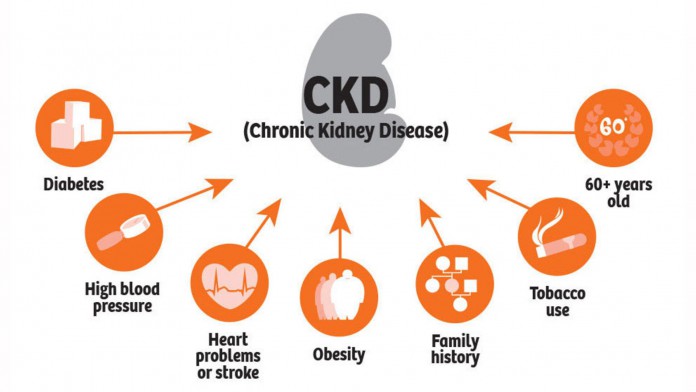Diet for the Chronic Kidney Disease is bit complicated but still it can be managed by following proper diet. Kidney disease can be categorized depending on the GFR (Glomerular Filtration Rate, a measure of your level of kidney function) and kidney damage. There are 5 stages of Chronic Kidney Disease (CKD) starting from CKD stage 1 to stage 5. Treatment including medical and nutritional plan also varies depending on the stages of kidney disease.

Important Announcement – EasyShiksha has now started Online Internship Program “Ab India Sikhega Ghar Se”

Top Courses in Virtual Reality
More Courses With Certification
Why Nutrition is important for CKD
Nutrition requirement varies from individual to individual. Though diet is very much important for those individuals who are on medication or not as because,
- To get energy
- To maintain the healthy weight
- To prevent from infections
- To maintain blood parameters
Nutrients and CKD
Those individuals having CKD should follow a Renal diet. But the diet is always individualized in terms of calorie requirement, protein requirement and micro nutrient requirements.
Protein:
Protein helps us to build muscle, repair tissue and fight against infections. Protein intake for kidney disease patients depends on the muscle mass and stage of kidney disease. Those who are undergoing dialysis require more protein because dialyses filter out wastes from blood, it also removes proteins and due to that muscle starts to break down. This break down of muscle can make the individual fatigue and make them more prone to infections.
Protein is divided into two categories. One is first class and the other one is second class. First class proteins are generally absorbed easily in the body compared to second class proteins. Though a combination of protein is recommended for these patients of course considering the blood reports.
Sources:
First class protein source includes Egg, Chicken, Fish, Red meat.
Second class protein includes Milk and milk products, Soya, Tofu, Beans, Legumes and Pulses etc.
Sodium:
Sodium affects blood pressure & water balance in the body. If individuals suffering from CKD, Sodium & Fluid buildup in the body, which can lead to swelling
Sodium should always restrict from diet regime for those individuals suffering from kidney disease.
Sources: All packaged food including Ketchup, Soy sauce, Processed meat, Salted snacks including chips or namkeens, Papad, Pickle etc.
Always Read food label before using it.
Potassium:
Potassium rich diet is always restricted for an individual with CKD. A normal kidney removes potassium through urination. Kidney’s that are not functioning properly cannot remove potassium in the urine, so it builds up in the blood. High potassium can cause irregular heartbeat & can even cause heart to stop working.
Sources: Banana, Fruits and fruit juices, Tender coconut water, Ragi, Green leafy vegetables except Fenugreek leaves, Tomato, Potato etc
Phosphorus:
Person with kidney disease may not be able to remove the excess Phosphorus from the blood. For a safer side food high in Phosphorus can be restricted. A high level of Phosphorus in the blood can cause Calcium to build up in the blood vessels, heart joints, muscles and skin which can lead to poor blood circulation, bone pain and skin ulcers.
Top Courses in Software Engineering
Sources: Dairy product including Milk, Cheese, Yogurt, Curd; Nuts; Dried beans; Beverages like Cocoa, Beer & Soft drink etc.
Fluids: Depending on the Chronic kidney disease stages and urine output fluid intake can be calculated. To control intake individual should
Not drink more than the Doctor’s advice. Fluid intake can be calculated including Tea, Coffee, Sambar, Rasam etc.
Individualized diet plan should help the individual to maintain the optimal nutrition. Doctor and Dietitian plan the treatment depends on the condition and it varies person to person.
Always refer to your personalized meal plan prescribed by your Dietitian.
Top Courses in Networking
Empower your team. Lead the industry
Get a subscription to a library of online courses and digital learning tools for your organization with EasyShiksha
Request NowQ. Are EasyShiksha's internships truly free?
Yes, all internships offered by EasyShiksha are completely free of charge.
Q. How can I apply for an internship with EasyShiksha?
You can apply by visiting our website, browsing available internships, and following the application instructions provided.
Q. What types of internships are available through EasyShiksha?
EasyShiksha offers a wide range of internships across technology, business, marketing, healthcare, and more. Opportunities are continuously updated.
Q. Will I receive a certificate upon completing an internship?
Yes, upon successful completion, you will receive a certificate recognizing your participation and achievements.
Q. Are EasyShiksha's internship certificates recognized by universities and employers?
Yes, the certificates are recognized by universities, colleges, and employers worldwide.
Q. Is the download of certificates free or paid?
Access to internships and courses is free, but there is a small fee to download certificates, covering administrative costs.
Q. When can I start the course?
You can choose any course and start immediately without delay.
Q. What are the course and session timings?
These are fully online courses. You can learn at any time and pace. We recommend following a routine, but it depends on your schedule.
Q. What will happen when my course is over?
After completion, you will have lifetime access to the course for future reference.
Q. Can I download the notes and study material?
Yes, you can access and download course materials and have lifetime access for future reference.
Q. What software/tools would be needed for the course?
All necessary software/tools will be shared during the training as needed.
Q. I’m unable to make a payment. What should I do?
Try using a different card or account. If the problem persists, email us at info@easyshiksha.com.
Q. Do I get the certificate in hard copy?
No, only a soft copy is provided, which can be downloaded and printed if required.
Q. The payment got deducted but shows “failed”. What to do?
Technical errors may cause this. The deducted amount will be returned to your account in 7-10 working days.
Q. Payment was successful but dashboard shows ‘Buy Now’?
Sometimes payment reflection is delayed. If it takes longer than 30 minutes, email info@easyshiksha.com with the payment screenshot.
Q. What is the refund policy?
If you face technical issues, you can request a refund. No refunds are issued once the certificate has been generated.
Q. Can I enroll in a single course?
Yes, select the course of interest, fill in the details, make payment, and start learning. You will also earn a certificate.
Q. My questions are not listed above. I need further help.
Contact us at info@easyshiksha.com for further assistance.
ALSO READ: 10-ways-to-find-part-time-jobs-for-2020
Get Course: Web-Designing–HTML-CSS-and-Twitter-Bootstrap






































































